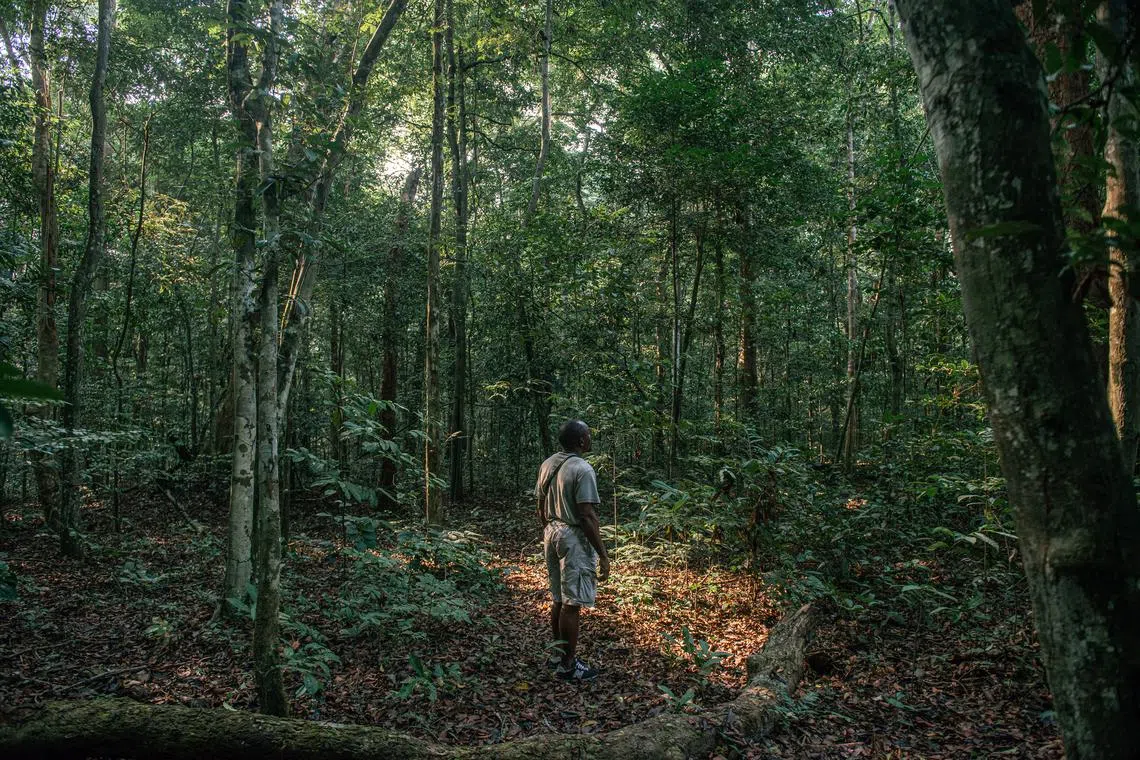NUS research initiative to boost credibility of nature-based carbon projects in S-E Asia
Sign up now: Get ST's newsletters delivered to your inbox

In the Asia-Pacific region, about 58 per cent of forests are under threat and could be protected through economically viable carbon credit projects.
PHOTO: NYTIMES
SHARM EL-SHEIKH, Egypt – A $15 million project launched on Thursday aims to improve the credibility of nature-based carbon projects in areas like rainforests across South-east Asia.
The programme, launched at the COP27 climate summit
Conducted by the National University of Singapore’s Centre for Nature-based Climate Solutions (CNCS), it builds on the centre’s existing work, which leverages satellite data and existing information to map out potential areas in South-east Asia that can be conserved and hence developed as sources of high-quality carbon credits.
Each carbon credit represents one tonne of emissions, and can be purchased by companies or countries to offset their greenhouse gas emissions.
In collaboration with partners such as other universities, government agencies and corporations in the region, researchers from CNCS will create monitoring plots using sophisticated tools, including light detection and ranging technology, to generate precise information about these habitats.
This will allow for more accurate and region-specific estimation of the carbon stocks in various types of ecosystems, including rainforests, mangroves, freshwater swamp forests, peatlands and deciduous forests.
Currently, most estimates are done using global and pan-tropical models, and often encompass a one-size-fits-all approach.
The monitoring plots also measure the permanence of these carbon stocks over time.
In the Asia-Pacific region, about 58 per cent of forests is under threat and could be protected through economically viable carbon credit projects, said the CNCS in a statement on Thursday.
“CNCS research shows that the Asia-Pacific region has the highest concentration of the most profitable carbon projects, which can generate returns on investment at close to US$25 billion (S$35 billion) per year,” it said in the statement.
The generation of these carbon projects could also allow 835 million tonnes of carbon dioxide – almost half the emissions in Indonesia in 2018 – to be avoided each year from deforestation, said CNCS.
Protecting these forests also has co-benefits including provision of water purification services, safeguarding of food security, and biodiversity conservation.
However, uncertainty over the amount of carbon stored in a natural habitat can be a deterrent to project developers and investors.
Therefore, to improve the integrity and credibility of these projects, an evidence base has to be established for informing policy and investment decisions, said CNCS.
In addition, it will help to ensure a stable supply of high-quality, nature-based carbon credits from the South-east Asian region to meet global market demands, it added.
For example, CNCS is partnering renewable energy company Energy Development Corporation in the Philippines to monitor the forests at its geothermal site in the Southern Negros region, which enables it to sequester CO2 emissions each year.
Professor Koh Lian Pin, director of CNCS, said: “CNCS looks forward to working with partners across the region on Carbon Integrity SG. By tapping South-east Asian expertise in forestry, geospatial technology and other sectors, we can tailor global models to our unique context.”
He hopes for Carbon Integrity SG’s work to give investors greater confidence in the quality of nature-based carbon projects, and to promote the conservation of these important habitats.
The project will also develop and improve internationally recognised standards and methodologies to ensure the credibility and integrity of the global carbon marketplace.
Mr Benedict Chia, director-general for climate change at Singapore’s National Climate Change Secretariat, said: “Carbon Integrity SG will enable high environmental integrity for nature-based carbon projects by ensuring that credits generated from these projects represent real and additional emission reduction.
“Given the large potential for nature-based abatement in the region, this initiative can play an important role to accelerate climate action.”



